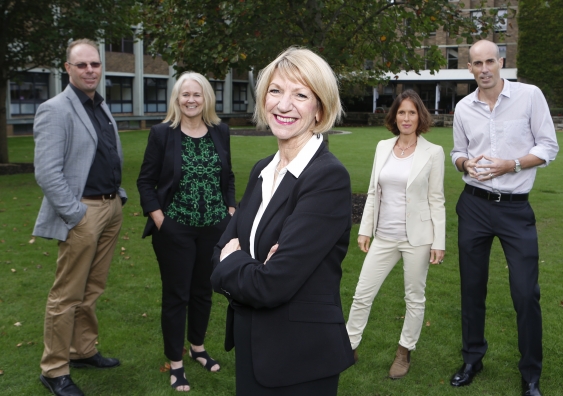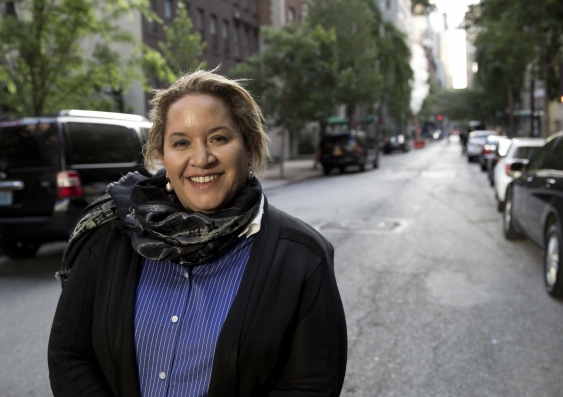Meet the Diversity Champions
Five new ‘Diversity Champions’ are embarking on a mission to help drive significant cultural change around equity, diversity and inclusion at UNSW.
Five new ‘Diversity Champions’ are embarking on a mission to help drive significant cultural change around equity, diversity and inclusion at UNSW.

Clare Morgan
UNSW Media & Content
(02) 9385 8920
clare.morgan@unsw.edu.au
UNSW has announced the names of five Equity, Diversity and Inclusion Champions who will help the University achieve its 2025 Strategy aim to better reflect the demographics of the communities it serves.
The Champions – Professor Laura Poole-Warren, who is leading the University’s Athena SWAN pilot program and is the Gender Champion; Professor Vanessa Lemm (Culture); Professor Andrew Lynch (Disability); Professor Mark Willcox (LGBTQI); and Mr Warwick Dawson (Flexible Work and Leave Options) – will advocate for their respective areas and work with staff and students to explain the changes that will take place at UNSW over the coming decade.
All five will be part of the Equity, Diversity and Inclusion Board which will meet quarterly and they will play a key role in raising awareness across the university.
A UNSW Indigenous Strategy led by an Indigenous Advisory Council is being developed by Indigenous staff at UNSW, including Professor Megan Davis, Director of the Indigenous Law Centre and Chair and UN expert member of the United Nations Permanent Forum on Indigenous Peoples. A member of the Indigenous Advisory Council will sit on the Equity, Diversity and Inclusion Board.

Megan Davis. Photo: Andrzej Liguz
The benefits of equity and diversity are clear, says Professor Eileen Baldry, who announced the five Champions in her capacity as Academic Chair of UNSW’s Equity, Diversity & Inclusion Board.
“Diverse workplaces produce better results than mono workplaces. Flexible workplaces produce better results than inflexible workplaces. Workplaces that are inclusive produce a better culture of work,” says Baldry.
UNSW President and Vice-Chancellor Professor Ian Jacobs says improving equity, diversity and inclusion is an important part of UNSW’s 2025 Strategy.
“I am delighted by the response we have had to this initiative and I look forward to working closely with Professor Baldry and our five Diversity Champions and the Indigenous Advisory Council to lead and inspire the staff and student elements of the ‘Just Society’ theme of our strategy.”
Baldry, a former Interim Dean of the Faculty of Arts & Sciences, says she was overwhelmed by the number and calibre of the expressions of interest for the lead diversity roles from academic and professional staff.
“We had dozens and dozens of applications from people who are clearly very passionate about diversity and equity,” she says. “Many of our colleagues are keen and willing to put energy into this enterprise.
“We are being shown up by corporations which set up set up equity targets years ago and we must change.”
“We are not ignoring merit. In fact it’s the opposite,” she says. “We are doing a disservice to UNSW if we are not gathering the best people from all backgrounds.”
The 2025 Strategy must be infused with equity, diversity and inclusion because these will lift our game and mark us out as a global, diverse and excellent community of scholars and professional staff.
Baldry says the Vice-Chancellor wanted to know what opportunities we were missing by not being inclusive. “He asked us ‘Who are we not employing here by doing what we’ve always done?’ People coming from different worlds, different life experiences, different life courses, bring a richness of humanity,” she says.
That includes students as well as staff.
“If we are not striving to include people from a low socio-economic background, Indigenous Australians, refugees, single parents… if we do not work hard at bringing them into the university as students, we are not preparing the next generation of social, professional and political leaders, those who will run our corporations,” Baldry says.
She is realistic about how long such change might take. “Real social change takes a generation.”
One of the first big pieces of work will be around unconscious bias. The University will develop ways to help people identify and change otherwise hidden beliefs and attitudes regarding gender, race and culture.
“If we want to reflect our community and we are a university that speaks to a contemporary Australian community, we have to address unconscious bias. We have to take literal, concrete and bold steps to do that; this is what the Vice-Chancellor is demanding,” Baldry says.
This means targets as well as providing for example more flexible workplaces, more scholarships for Indigenous Australians and people from low socio-economic backgrounds, and supporting women seeking promotions, Baldry says.
“The 2025 Strategy must be infused with equity, diversity and inclusion because these will lift our game and mark us out as a global, diverse and excellent community of scholars and professional staff.”
Baldry is also encouraged by the enormous interest shown by students.
“The students are as keen as mustard to get involved. They say ‘of course this is the way we should be going’.
“For them, this is a no-brainer.”
Professor Laura Poole-Warren, Gender
“Diversity is central to our long-term success and that is why the UNSW commitment to gender equity is such an important part of our 2025 Strategy. Our achievements as an innovative university rest on us embracing diversity. I am so excited to be part of the team that will be addressing diversity, equity and inclusion at UNSW. I bring to the role a passion for gender equity and depth of knowledge and experience in the challenges facing women in higher education and research.”
Warwick Dawson, Flexible Work and Leave Options
“One of the reasons I enjoy working at the university is the support and recognition provided via flexible work and leave options which enable work-life balance. I have benefited from two paternity leaves and various periods of carers leave to look after elderly parents and dependent children. As a supervisor, I have had the privilege of supporting many staff who have taken maternity leave and returned to work on a part-time basis. These options are essential to ensure we can attract and retain talented staff members and ensure gender balance and diversity in our workforce.”
Professor Mark Willcox, LGBTQI
"I understand the pressures that can be experienced by the LGBTQI community within the workplace, as students and at home. During my time at UNSW (since 1993) I have never been discriminated against due to my sexuality, but I have witnessed discrimination outside of the university system, and have met challenges during my collaborative work with industry. Universities tend to be accepting places, but issues can arise for many when transitioning from university to the workplace.”
Professor Vanessa Lemm, Cultural
“At the School of Humanities and Languages, we speak over 25 languages and publish in over 15 languages. We believe in the importance of practising and preserving languages other than English and hold stream and program meetings in foreign languages such as Japanese, Chinese, Korean, German, and French. Our meetings are then minuted in English to be accessible to all staff across the school. I feel very strongly about the need for respect and acceptance of cultural diversity, inclusion and equal opportunity. It is a great honour for me to be given the responsibility to foster cultural diversity at UNSW as a Diversity Champion.”
Professor Andrew Lynch, Disability
“My commitment to diversity derives from two basic ideas: that simple fairness requires equality of access and opportunity, and that any organisation is greatly enriched by and benefits from a membership that is diverse rather than homogeneous. In my own research I explore these themes in the context of the Australian judiciary and legal profession, but they are universal. They unquestionably apply to the university community and the value of the educational experience we offer all our students."